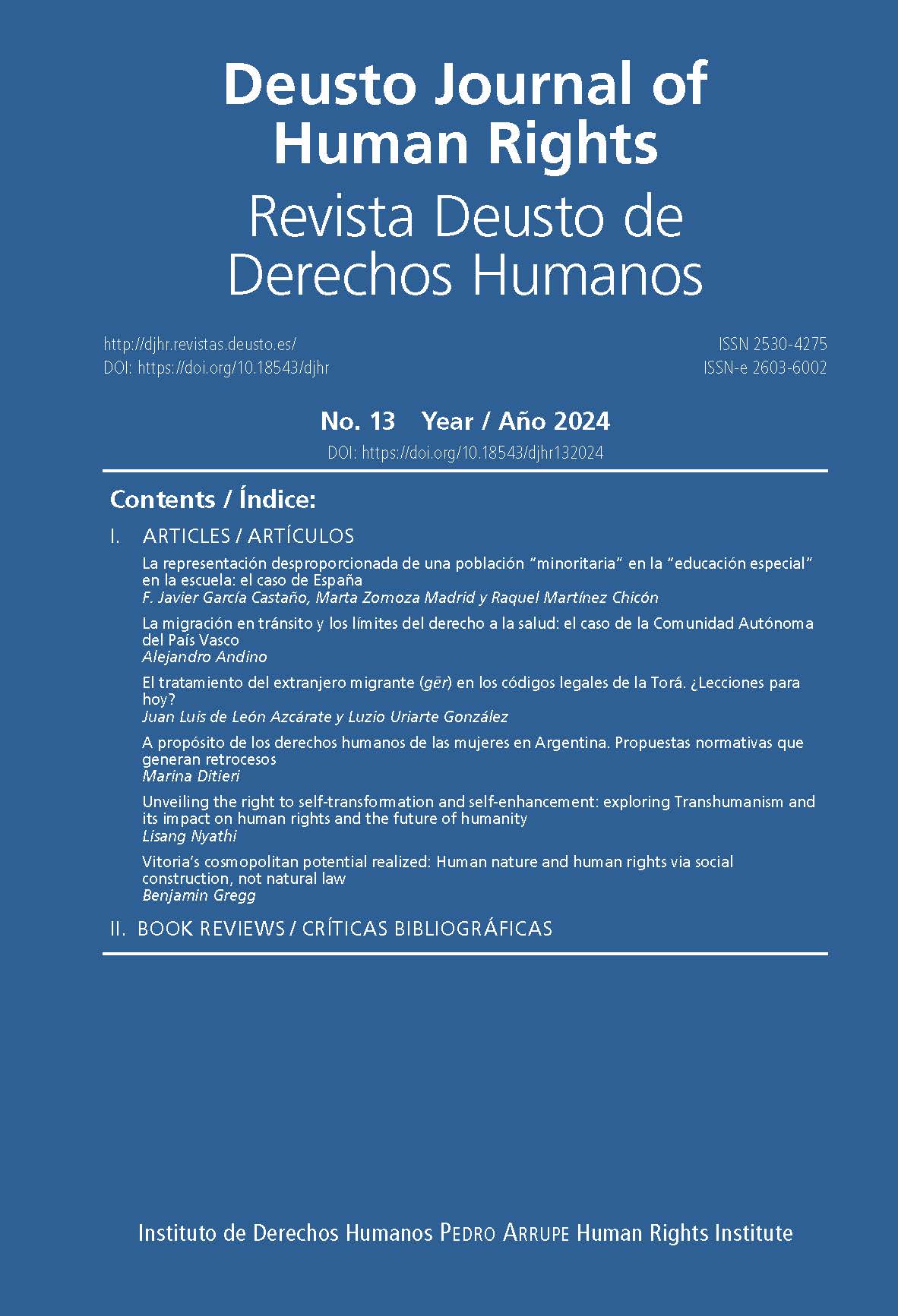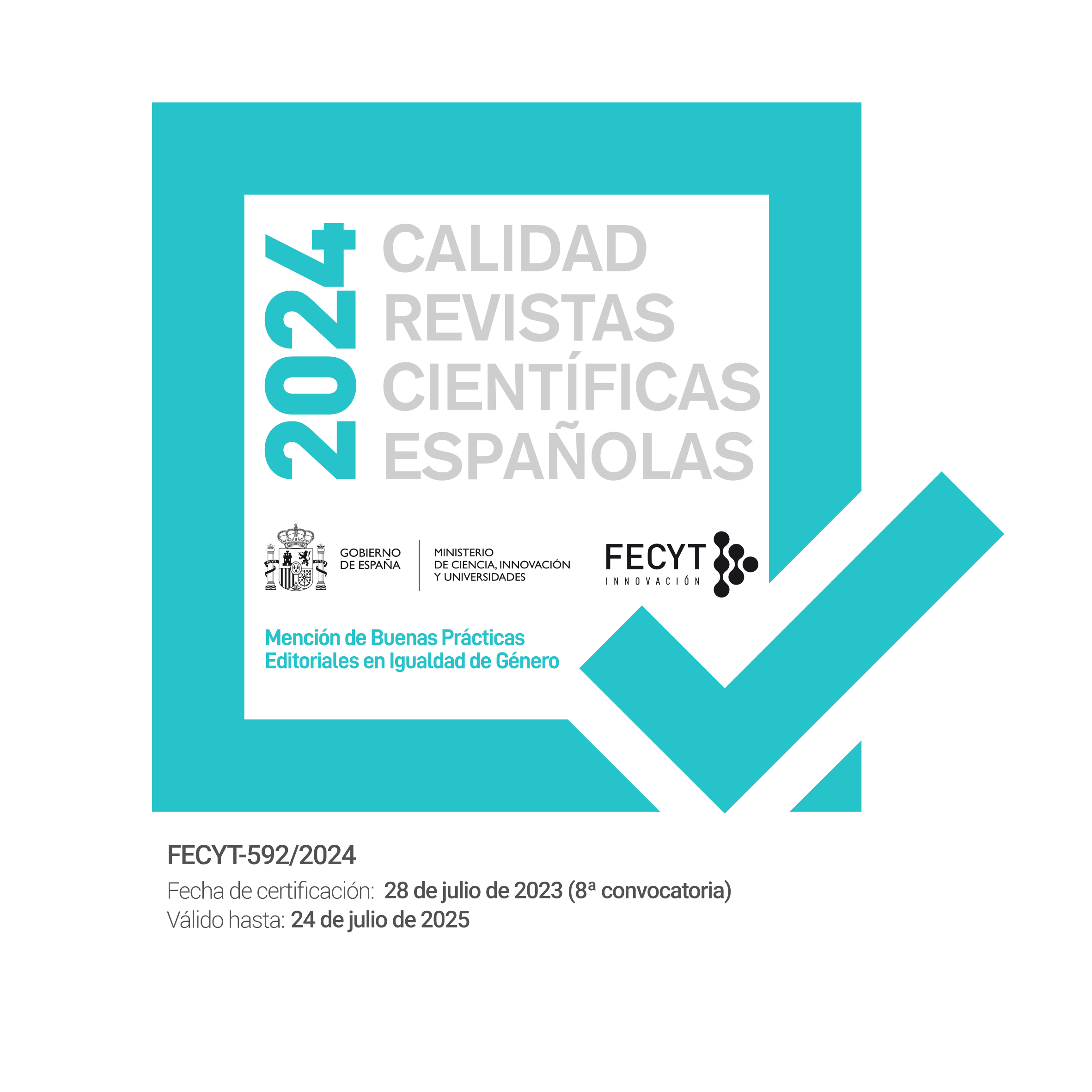El tratamiento del extranjero migrante (gēr) en los códigos legales de la Torá. ¿Lecciones para hoy?
Resumen
Para millones de personas judías y cristianas la Biblia sigue siendo el texto fundacional que orienta sus vidas y su comportamiento social, incluido el relacionado con las personas migrantes y desplazadas. A diferencia de los códigos legales del Antiguo Oriente Próximo, en los que no se menciona a este tipo de personas, en la Torá se encuentran tres códigos legales (Código de la Alianza, Código Deuteronómico, Código de Santidad) que contienen referencias explícitas a la figura del gēr, término hebreo que se aproxima bastante a lo que hoy se entiende por “inmigrante” o “refugiado”. Estos códigos, que datan entre los siglos VIII y V a. C. muestran una gran preocupación por las personas desplazadas en situación de vulnerabilidad. El artículo analiza cómo cada código intentó dar respuesta a la vulnerabilidad del gēr, justificándolo en la propia experiencia de Israel como pueblo desplazado y liberado por Yahvé, su Dios.
Recibido: 13 julio 2023
Aceptado: 18 octubre 2023
Descargas
Citas
Achenbach, Reinchard. 2011. «Gêr – nåkhrî – tôshav – zâr: Legal and sacral distinctions regarding foreigners in the Pentateuch». En The foreigner and the law: Perspectives from the Hebrew Bible and the Ancient Near East, editado por Reinhard Achenbach, Rainer Albertz y Jakob Wöhrle, 29-51. Wiesbaden: Harrassowitz Verlag.
Albertz, Rainer. 1999. Historia de la religión de Israel en tiempos del Antiguo Testamento. 1. De los comienzos hasta el final de la monarquía. Madrid: Trotta.
Albertz, Rainer. 2011. «From aliens to proselytes: Non-Priestly and Priestly legislation concerning strangers». En The foreigner and the law: Perspectives from the Hebrew Bible and the Ancient Near East, editado por Reinhard Achenbach, Rainer Albertz y Jakob Wöhrle, 53-69. Wiesbaden: Harrassowitz Verlag.
Altmann, Peter. 2011. Festive meals in Ancient Israel: Deuteronomy’s identity politics in their Ancient near Eastern context. Berlin: De Gruyter.
Awabdy, Mark A. 2014. Immigrants and innovative law Deuteronomy’s theological and social vision for the גר. Tübingen: Mohr Siebeck.
Body, Daniel. 2014. «The story of Samuel, Saul, and David». En Ancient Israel’s History. An introduction to issues and sources, editado por Bill T. Arnorld y Richard S. Hess, 190-226. Grand Rapids, Michigan: Baker Academic.
Bravo, Arturo. 2022. «Los migrantes en el Antiguo Testamento. ¿Aceptación o rechazo?». Teología y Vida 63: 561-590, https://doi.org/10.7764/tyv634.e5.
Burke, Aaron A. 2011. «An anthropological model for the investigation of the archaeology of refugees in Iron Age Judah and its environs». En Interpreting exile. Displacement and deportation in biblical and modern contexts, editado por Brad E. Kelle, Frank R. Ames y Jacob L. Wright, 41- 56. Atlanta: Society of Biblical Literature.
Craigie, Peter C. 1981. The book of Deuteronomy. Grand Rapids, Michigan: William B. Eerdmans.
De Vaux, Roland. 1976. Instituciones del Antiguo Testamento. Barcelona: Herder.
Faust, Avraham. 2012. The archaeology of Israelite society in Iron Age II. Winona Lake, Indiana: Eisenbrauns.
Fensham, F. Charles. 1962. «Widow, orphan, and the poor in Ancient near Eastern legal and wisdom literature». Journal of Near Eastern Studies 21, n. 2: 129-139. https://www.jstor.org/stable/543887.
Finkelstein, Israel y Neil A. Silberman. 2003. La Biblia desenterrada. Una nueva visión arqueológica del antiguo Israel y de los orígenes de sus textos sagrados. Madrid: Siglo XXI.
Finkelstein, Israel. 2013. The forgotten kingdom. The archaeology and history of Northern Israel, Atlanta: Society of Biblical Literature.
García López, Félix. 2014. Pentateuco. Estella: Verbo Divino. Glanville, Mark R. 2018a. «The Gēr (stranger) in Deuteronomy: Family for the displaced». Journal of Biblical Literature 137: 599-623, https://doi.org/10.15699/jbl.1373.2018.446687.
Glanville, Mark R. 2021. «חרם (ḥērem) as Israelite identity formation: Canaanite destruction and the stranger (גר, gēr)». The Catholic Biblical Quarterly 83: 547-570, https://doi.org/10.1353/cbq.2021.0120.
Glanville, Mark. R. 2018b. Adopting the stranger as kindred in Deuteronomy. Atlanta: SBL Press.
Gowan, Donald E. 1987. «Wealth and poverty in the Old Testament: The case of the widow, the orphan, and the sojourner». Interpretation 41: 341- 353, https://doi.org/10.1177/002096438704100402.
Grabbe, Lester L. 2007. Ancient Israel. What do we know and how do we know it? Londres: T & T Clark.
Habermas, Jürgen. 2008. «¿Fundamentos prepolíticos del Estado democrático de derecho?». En Entre razón y religión. Dialéctica de la secularización, Jürgen Habermas y Joseph Ratzinger, 9-29-. México: Fondo de Cultura Económica.
Houtman, Cornelis. 1993. Exodus. Volumen 1. Kampen: Kok Publishig House.
Houtman, Cornelis. 1996. Exodus. Volumen 2. Kampen: Kok Publishig House.
Houtman, Cornelis. 2000. Exodus. Volumen 3. Leuven: Peeters.
Itach, Gilad. 2018. «The Kingdom of Israel in the Eighth Century: From a regional power to Assyrian provinces». En Archaeology and History of Eighth-Century Judah, editado por Zev I. Farber y Jacob L. Wright, 57-77. Atlanta: SBL Press.
Joosten, Jan. 1996. People and land in the Holiness code: An exegetical study of the ideational framework of the Law in Leviticus. Leiden: Brill.
Knauth, R. J. D. 2003. «Alien, foreign resident». En Dictionary of the Old Testament. Pentateuch, editado por T. Desmond Alexander y David W. Baker, 26-33. Downers Grove, Illinois: IVP Academic.
Kugler, Robert. 2016. «Leviticus». En The Pentateuch. Fortress commentary on the Bible Study Edition, editado por Gale A. Yee, Hugh R. Page y Matthew J.M. Coomber, 179-210. Minneapolis: Fortress Press.
Küng, Hans. 2000. Proyecto de una ética mundial. Madrid: Trotta.
Langner, Córdula. 2013. «“Lo straniero in mezzo a te”. Le tante facce degli stranieri nella Bibbia ebraica come impulso per una relazione con gli stranieri nell’oggi». En Il diverso e lo straniero nella Bibbia ebraico- cristiana. Uno studio esegetico-teologico in chiave interculturale, editado por Massimo Grilli y Joseph Maleparampil, 87-103. Bologna: Dehoniane Bologna.
Lapidot, Elad. 2019. «Ger: deterritorialized immigrant in talmudic exile». Jewish Culture and History 20: 23-42, https://doi.org/10.1080/1462169X.2019.1557460.
Lipschits, Oded y Manfred Oeming, eds. 2014. Judah and the Judeans in the Persian period. Winona Lake, Indiana: Einsenbrauns.
Lohfink, Norbert. 1991. «Poverty in the Laws of the Ancient Near East and of the Bible». Theological Studies 52: 34-50, https://doi.org/10.1177/004056399105200103.
Martin-Achard, Robert. 1978. «‘Gur’: Residir como forastero». En Diccionario Teológico Manual del Antiguo Testamento. Tomo I, editado por Ernst Jenni y Claus Westermann, 583-588. Madrid: Cristiandad.
Marzouk, Safwat. 2022. «Different kinds of foreignness. The Hebrew Bible’s terminology for foreigners». En Christianity and the law of migration, editado por Silas W. Allard, Kristin E. Heyer y Raj Nadella, 147-164. Londres: Routledge.
Mayshar, Joram. 2014. «Who was the Toshav?». Journal of Biblical Literature 133: 225-246 https://doi.org/10.15699/jbibllite.133.2.225.
McAuliffe, Marie y Anna Triandafyllidou, eds. 2021. Informe sobre las migraciones en el mundo 2022. Ginebra: OIM. https://publications.iom.int/books/informe-sobre-las-migraciones-en-el-mundo-2022.
Milgrom, Jacob. 2001. Leviticus 23-27. A new translation with introduction and commentary. Nueva York: The Anchor Bible Doubleday.
Na’aman, Nadav. 2008. «Sojourners and Levites in the Kingdom of Judah in the seventh century BCE». Zeitschrift für altorientalische und biblische Rechtsgeschichte 14: 237-279.
Nelson, Richard. D. 2004. Deuteronomy. A commentary. Londres: Westminster John Knox Press.
Nihan Christophe. 2004. «The Holiness code between D and P: Some comments on the function and significance of Leviticus 17-26 in the composition of the Torah». En Das Deuteronomium zwischen Pentateuch und Deuteronomistischem Geschichtswerk, editado por Eckart Otto y Reinhard Achenbach, 81-122. Göttingen: Vandenhoeck & Ruprecht.
Nihan, Christophe. 2011. «Resident aliens and natives in the Holiness legislation». En The foreigner and the law: Perspectives from the Hebrew Bible and the Ancient Near East, editado por Reinhard Achenbach, Rainer Albertz y Jakob Wöhrle, 111-134. Wiesbaden: Harrassowitz Verlag.
Pitkänen, Pekka. 2017. «Ancient Israelite population economy: Ger, Toshav, Nakhri and Karat as settler colonial categories». Journal for the Study of the Old Testament 42: 139-153, https://doi.org/10.1177/0309089216677665.
Preuss, Horst Dietrich. 1996. Old Testament Theology. Volume II. Louisville, Kentucky: Westminster John Knox Press.
Radner, Karen. 2015. «Hired labor in the neo-Assyrian Empire». En Labor in the Ancient World. Volume V. A Colloquium Held at Hirschbach (Saxony), April 2005, editado por Piotr Steinkeller y Michael Hudson, 329-343. Dresden: ISLET.
Ramírez, José E. 1999. Alterity and identity in Israel. Berlin: Walter de Gruyter.
Rendtorff, Rolf. 2002. «The Gër in the Priestly Laws of the Pentateuch». En Ethnicity and the Bible, editado por Mark G. Brett, 77-87. Leiden: Brill Academic Publishers.
Rifkin, Jeremy. 2010. La civilización empática. La carrera hacia una conciencia global en un mundo en crisis. Barcelona: Paidós.
Ruíz, Eleuterio R. 2018. «“Extranjeros y refugiados” (1 Pe 2,11; cf. Gn 23,4). Reflexiones sobre un desafío de nuestro tiempo a la luz de la Escritura». Revista Teología 55: 31-54. Acceso el 28 de abril de 2024: https://erevistas.uca.edu.ar/index.php/TEO/article/view/1282https://erevistas.uca.edu.ar/index.php/TEO/article/view/1282.
Schmid, Konrad. 2019. Historia literaria del Antiguo Testamento. Una introducción. Madrid: Trotta.
Sneed, Mark. 1999. «Israelite concern for the alien, orphan, and widow: Altruism or ideology?». Zeitschrift für die Alttestamentliche Wissenschaft 111: 498-507, https://doi.org/10.1515/zatw.1999.111.4.498.
Spencer, John R. 1992. «Sojourner». En The Anchor Bible Dictionary. Vol. 6, editado por David Noel Freedman, 103-104. Nueva York: Doubleday.
Taylor, Charles. 1994. La ética de la autenticidad. Barcelona: Paidós.
Tsai, Daisy Y. 2014. Human rights in Deuteronomy with special focus on slave laws. Berlin: Walter de Gruyter.
Van Houten, Christiana. 1991.The Alien in Israelite Law. Sheffield: Sheffield Academic Press.
Varo, Francisco. 2018. «L’arrière-plan sociologique du champ sémantique de l’étranger dans le Pentateuque». Revue des sciences philosophiques et théologiques 102: 385-414, https://doi.org/10.3917/rspt.1023.0385.
Varo, Francisco. 2020. «Israel y los pueblos extranjeros en el Pentateuco». En “Sal de tu Tierra”. Estudios sobre el extranjero en el Antiguo Testamento, editado por Guadalupe Seijas de los Ríos-Zarzosa, 27-36. Estella: Verbo Divino.
Walton, John H. 1990. Ancient Israelite literature in its cultural context. Michigan: Zondervan Publishing House.
Weinfeld, Moshe. 1991. Deuteronomy 1–11. A new translation with introduction and commentary, Nueva York: Doubleday.
Wöhrle, Jakob. 2011. «The integrative function of the law of circumcision». En The foreigner and the law: Perspectives from the Hebrew Bible and the Ancient Near East, editado por Reinhard Achenbach, Rainer Albertz y Jakob Wöhrle, 71-87. Wiesbaden: Harrassowitz Verlag.
Wright, David. 2014. «The origin, development, and context of the Covenant Code (Exodus 20:23–23:19)». En The book of exodus composition, reception, and interpretation, editado por Thomas B. Dozeman, Craig A. Evans y Joel N. Lohr, 220-244. Leiden: Brill.
Wuench, Hans-George. 2014. «The stranger in God’s land – foreigner, stranger, guest: What can we learn from Israel’s attitude towards strangers?». Old Testament Essays 27: 1129-1154. Acceso el el 28 de abril de 2024: https://www.scielo.org.za/pdf/ote/v27n3/19.pdf.
Zehnder, Markus. 2018. «Mass-migration to the western world in light of the Hebrew Bible: The challenge of complexity». European Journal of Theology 27, n. 17: 4-17. Acceso el 28 de abril de 2024: https://digitalcommons.biola.edu/faculty-articles/399.
Deusto Journal of Human Rights / Revista Deusto de Derechos Humanos es una revista de Acceso Abierto; lo que significa que es de libre acceso en su integridad inmediatamente después de la publicación de cada número. Se permite su lectura, la búsqueda, descarga, distribución y reutilización en cualquier tipo de soporte sólo para fines no comerciales y según lo previsto por la ley; sin la previa autorización de la Editorial (Universidad de Deusto) o la persona autora, siempre que la obra original sea debidamente citada (número, año, páginas y DOI si procede) y cualquier cambio en el original esté claramente indicado. Cualquier otro uso de su contenido en cualquier medio o formato, ahora conocido o desarrollado en el futuro, requiere el permiso previo por escrito de la persona titular de los derechos de autoría.



3.jpg)
3.jpg)
3.jpg)
.jpg)








